Pico-Pico Boy Review: A unique take on the 8 bit era
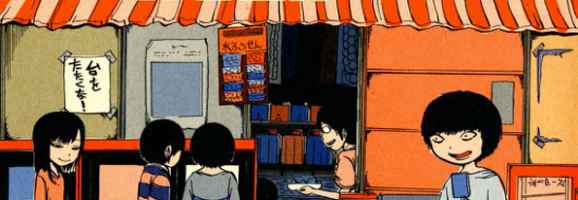
Pico-Pico Boy is not a manga about Japanese game history, it’s a compilation of short, personal, autobiographical stories about Rensuke Oshikiri’s childhood and the impact games had on his life. The story begins in the early 80’s with Oshikiri’s addiction to the Game and Watch, and ends with him looking at his favorite titles from the current generation of consoles. Oshikiri focuses greatly on the exploitation and ordeals that he had to suffer as a gamer. Whether it was the late night queuing, the fights, the lost relationships or the alienation, each story depicts a different way in which games both advantaged and disadvantaged Oshikiri’s life in a powerful nostalgic narrative.
As someone who is interested in Japanese geek culture I found learning about the day-to-day occurrences in a game center and the rivalries which occur over certain games interesting, however if you’re not a gamer or have little interest in otakuism then you may not find this title a worth while read. However geeks may be able to empathize with the loneliness which Oshikiri feels due to his failure to find a ‘3D’ relationship. Rather disturbingly however, instead of going for a regular girl he prefers to see the girls which he meets in his dating sims games as his girlfriends, whilst this is unsettling, it’s an accurate depiction of how many otaku’s feel when it comes to relationships.
While the volume is powerful and fascinating, it must be noted that one story does not follow another, there is no clear progression through time, and quite often in fact some stories will commence in a time long before the previous episode. Often it will seem that a story is going to pick up on a previous plot point, but this rarely happens. This is mainly due to the fact that episodes were published infrequently over a three year period, meaning that it was difficult for Oshikiri to have any character progression or continuity. However despite this, Oshikiri still manages to convey a clear sense of how the gaming climate changed, for example: what games were game centers, where games were played and how non gamers viewed the gaming world are all shown to have changed in the last twenty years. The sense of change is enhanced in some chapters as occasionally Oshikiri depicts what it was like for him to return to some of the areas which he has so much nostalgia for. This makes it clear how rapidly the game market has changed in the last twenty years, and how despite the ever growing market many game center owners have developed little understanding about their audience.
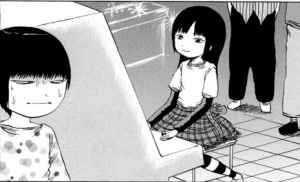 Oshikiri himself however is not particularly likeable. Due to his disgusting and over obsessive nature I couldn’t help but feel that he deserved some of the things that happened to him. However as a gamer myself, I sadly found a great nostalgia in many of the games and consoles which are described and have too, on occasions, made the wrong choices in my life due to my preference to stay at home and play games. Therefore in some ways he was quite easy to empathize with.
Oshikiri himself however is not particularly likeable. Due to his disgusting and over obsessive nature I couldn’t help but feel that he deserved some of the things that happened to him. However as a gamer myself, I sadly found a great nostalgia in many of the games and consoles which are described and have too, on occasions, made the wrong choices in my life due to my preference to stay at home and play games. Therefore in some ways he was quite easy to empathize with.
Pico-Pico Boy’s artwork is unique and highly original. The disturbing drooling boys and the distorted faces make many of the characters often look more alien than human, although this only further enforces both the sense of alienation from normal society which Oshikiri felt as a child and the intense obsession he and his friends had for games. The only title I can think of with a similar art style is Saturn Apartments due to the characters in both titles being similarly proportioned. However unlike Saturn Apartments, backgrounds and buildings are not beautifully drawn, there is a great overuse of screen tone and often I found it quite difficult to differentiate between characters due to the similar hair styles the majority of characters have.
Despite the great stories and artwork, the localization is quite poor. Yen has been changed to dollars, and quite often game or console names have had their names translated to English, this therefore made it on occasion difficult for me to know which game or console was being describing. However if you’re not as pernickety as me then you might not find this as much of a draw back.
Overall, whilst the localization was poor, I should be thankful that this title got a western release at all, both the art style and the nature of the plot appeal to an incredibly niche audience and it’s rare that such a title is given a chance in the current market. If you feel a certain nostalgia towards the 8 and 16 bit era or you want to learn about what it was like to be a gamer in the 80’s and 90’s Japan then you should consider spending your Jmanga points on this title. However if you have little interest in games, then the lack of continuity from story to story may deter you from looking at this one, although arguably Oshikiri’s unique character designs will give you a reason to read at least the free sample of this title.
Rating:
What do you think? Leave a comment.
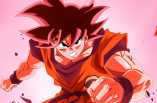
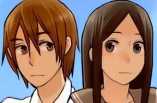

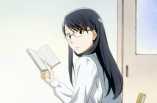
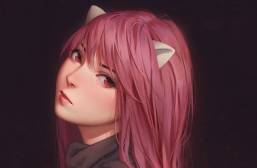
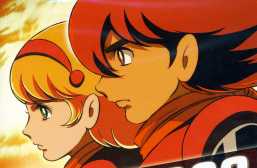
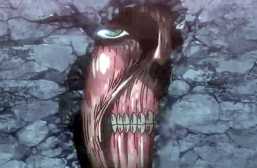
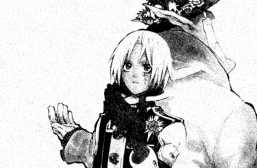
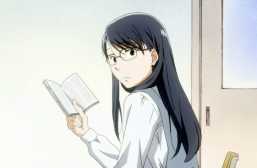
Sorry I forgot to say, Pico-Pico Boy is available now on Jmanga for 499 Jmanga points now, check it out!
Big retrogamer here so MUST read this! What is your preference, the 8bit or 16bit years?
I prefer the 16 bit years personally, I really enjoy the rpg’s which came out of that era (Chrono Trigger, the Illusion of Gaia, FFIV etc ) and I would strongly argue that the SNES was one of the best consoles ever manufactured in terms of the games available on it, I really liked some of the platformers which came out on mega drive too, also certainly graphically the 16 bit era was one of the best periods in video game history, however there are a five or six games which I enjoy from the 8 bit era like LOZ and Mega Man etc
The 16bit years was my childhood in a shell. While SNES had some great rpgs, the Genesis had some great ones too, like the Phantasy Star series, or the Shining Force, man those were the days…
That era was really a golden era for games
Mix of 64-bit and the 16-bit years. My N64 is still plugged in.
This sounds awesome!! I will keep a look out for it 😀
It really is! You should check it out, it’s only available to buy on Jmanga though so you might want to create an account if you don’t already have one 🙂
I guess I will be taking a look at Jmanga then too XD
New to this and liking the review!
Thank you 🙂
This does seem to be a foundation for successor otaku-themed anime.